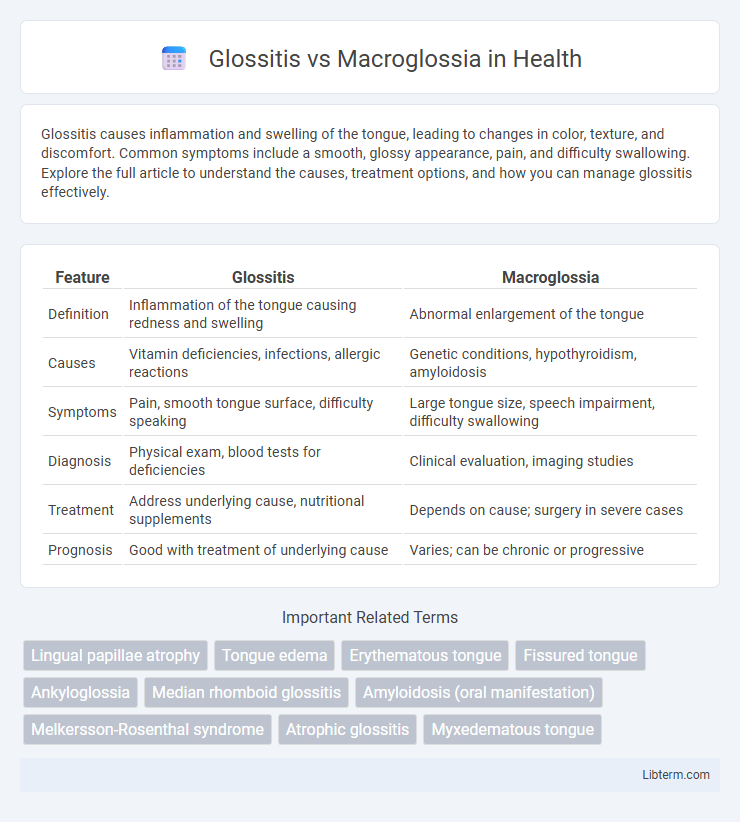Glossitis causes inflammation and swelling of the tongue, leading to changes in color, texture, and discomfort. Common symptoms include a smooth, glossy appearance, pain, and difficulty swallowing. Explore the full article to understand the causes, treatment options, and how you can manage glossitis effectively.
Table of Comparison
| Feature | Glossitis | Macroglossia |
|---|---|---|
| Definition | Inflammation of the tongue causing redness and swelling | Abnormal enlargement of the tongue |
| Causes | Vitamin deficiencies, infections, allergic reactions | Genetic conditions, hypothyroidism, amyloidosis |
| Symptoms | Pain, smooth tongue surface, difficulty speaking | Large tongue size, speech impairment, difficulty swallowing |
| Diagnosis | Physical exam, blood tests for deficiencies | Clinical evaluation, imaging studies |
| Treatment | Address underlying cause, nutritional supplements | Depends on cause; surgery in severe cases |
| Prognosis | Good with treatment of underlying cause | Varies; can be chronic or progressive |
Overview: Understanding Glossitis and Macroglossia
Glossitis is an inflammatory condition characterized by a smooth, swollen, and often painful tongue, commonly caused by nutritional deficiencies, infections, or allergic reactions. Macroglossia involves an abnormally enlarged tongue, which may result from congenital disorders, systemic diseases like amyloidosis, or tumors, potentially impacting speech and swallowing. Differentiating between glossitis and macroglossia is crucial for diagnosis, as glossitis presents primarily with inflammation and surface changes, while macroglossia is defined by tongue size enlargement without necessarily causing inflammation.
Definitions: What is Glossitis? What is Macroglossia?
Glossitis is the inflammation of the tongue characterized by swelling, color changes, and a smooth, glossy appearance often caused by nutritional deficiencies or infections. Macroglossia refers to an abnormal enlargement of the tongue that can be congenital or acquired, commonly seen in conditions like hypothyroidism, amyloidosis, or Down syndrome. Both conditions affect tongue morphology but differ significantly in etiology and clinical presentation.
Etiology: Causes of Glossitis vs Macroglossia
Glossitis is primarily caused by nutritional deficiencies such as vitamin B12, iron, or folate deficiency, as well as infections, allergic reactions, or irritants leading to inflammation of the tongue. Macroglossia results from congenital conditions like Down syndrome or hypothyroidism, as well as acquired causes including amyloidosis, lymphangioma, or muscular hypertrophy. Both conditions involve tongue alterations but differ significantly in their underlying etiologies, where glossitis stems from inflammatory or nutritional factors, and macroglossia arises from structural or systemic disorders.
Clinical Presentation and Symptoms
Glossitis presents clinically with a smooth, inflamed, and often painful tongue due to papillae loss, accompanied by symptoms such as burning sensation, soreness, and difficulty swallowing. Macroglossia is characterized by an enlarged tongue that may cause speech difficulties, obstructive sleep apnea, and mechanical issues like teeth indentations or difficulty closing the mouth. While glossitis primarily affects tongue texture and pain, macroglossia involves tongue size enlargement with associated functional impairments.
Diagnostic Criteria and Methods
Glossitis is diagnosed through clinical examination revealing inflammation, swelling, and smooth, erythematous tongue surfaces, often confirmed by patient history indicating nutritional deficiencies or infections. Macroglossia is identified by noticeable tongue enlargement causing functional issues like speech or swallowing difficulties, with diagnostic methods including physical measurement, imaging techniques such as MRI or CT scans, and assessment of underlying systemic disorders like amyloidosis or hypothyroidism. Differentiating the two conditions relies on evaluating tongue texture, size, symptom onset, and associated systemic signs to guide appropriate therapeutic approaches.
Risk Factors and Predisposing Conditions
Glossitis commonly arises from nutritional deficiencies such as vitamin B12, iron, and folate, along with inflammatory conditions like psoriasis and allergic reactions that predispose to tongue inflammation. Macroglossia is often linked to genetic disorders including Down syndrome, hypothyroidism, amyloidosis, and acquired conditions like lymphangioma that increase tongue size and structural abnormalities. Both conditions present distinct risk profiles, with glossitis primarily associated with metabolic and inflammatory issues, while macroglossia correlates with congenital and systemic diseases affecting tissue growth.
Treatment Strategies: Glossitis vs Macroglossia
Glossitis treatment focuses on addressing its underlying causes such as nutritional deficiencies, infections, or allergic reactions through vitamin supplementation, antifungal medications, or corticosteroids. Macroglossia treatment varies from conservative approaches like speech therapy and addressing systemic diseases to surgical reduction in severe cases affecting airway or oral function. Both conditions require targeted management based on etiology, with glossitis often resolving after cause treatment and macroglossia potentially needing more invasive interventions.
Complications and Prognosis
Glossitis often leads to complications such as pain, difficulty swallowing, and increased risk of oral infections due to inflammation and atrophy of the tongue's papillae. Macroglossia can cause airway obstruction, dental malocclusion, and speech difficulties, with a prognosis dependent on underlying causes like congenital disorders or systemic diseases. Early diagnosis and targeted treatment are crucial for improving patient outcomes and preventing long-term functional impairments in both conditions.
Prevention and Patient Education
Preventing glossitis involves maintaining proper oral hygiene, avoiding irritants such as tobacco and alcohol, and addressing nutritional deficiencies like iron, vitamin B12, and folate through diet or supplements. For macroglossia, early diagnosis of underlying causes such as hypothyroidism, amyloidosis, or genetic conditions is crucial, along with managing these conditions to prevent tongue enlargement. Patient education should emphasize regular dental check-ups, recognizing early symptoms, and adherence to prescribed treatments to minimize complications and improve oral health outcomes.
Key Differences and Summary Comparison
Glossitis is characterized by inflammation of the tongue, often causing redness, swelling, and a smooth appearance due to papillae loss, whereas macroglossia refers to an abnormal enlargement of the tongue, frequently associated with genetic conditions or systemic diseases. Glossitis typically results from nutritional deficiencies, infections, or irritants, while macroglossia may lead to speech difficulties, airway obstruction, and dental issues due to tongue size. Key differences include etiology, clinical presentation, and complications, with glossitis emphasizing inflammatory changes and macroglossia involving structural enlargement.
Glossitis Infographic

 libterm.com
libterm.com